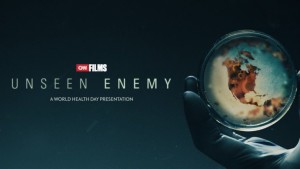 SARS. Zika. Ebola. Bird Flu. These are the names of recent disease pandemics that can inflict not only severe illness and death but also massive amounts of fear.
SARS. Zika. Ebola. Bird Flu. These are the names of recent disease pandemics that can inflict not only severe illness and death but also massive amounts of fear.
And while it is incredibly difficult to watch the human suffering that these outbreaks cause, it’s important to know as much as possible about them and how to prevent future eruptions.
CNN Films’ “Unseen Enemy” goes behind the headlines to investigate the root causes and results of recent deadly and life-threatening epidemics like the Zika virus, which threatened to decimate last summer’s Olympic Games in Rio de Janeiro, and the Ebola virus, which devastated populations in West Africa and caused near hysteria in the United States when it made its way to these shores.
The documentary debuts Friday as part of a World Health Day presentation and is narrated by Emmy and Golden Globe Award-winning actor Jeffrey Wright and written and directed by filmmaker Janet Tobias. CNN’s chief medical correspondent Sanjay Gupta, M.D., is an executive producer, as is philanthropist Paul Allen, who was instrumental for his leadership during the 2014 Ebola outbreak.
“It’s an enormous topic, more so than any other health topic because everyone in the world is affected. The magnitude felt so large,” Gupta said in a phone interview from his office at CNN in New York.
The film is the culmination of three years of work — begun before the Ebola crisis struck — in which Tobias embedded her film crew with some of the world’s top medical professionals and pathogen hunters across the globe to track outbreaks of these sorts of epidemics, which, less exotically but equally deadly, also include influenza.
“The big concern is around pandemics of flu. In 1918, the Spanish flu killed anywhere between 50 million and 100 million people. It’s really startling,” Gupta said. “The big concern that keeps most experts up at night is a highly lethal pandemic flu, a flu virus that spreads person to person, is airborne and very lethal. It’s usually a brand new virus that has never been seen before — and there is no protection against this.”
Despite the cause for concern, Gupta said we are much better equipped as a global society in dealing with influenza. “We have the capacity to create a vaccine quickly for a pandemic,” he said.
One of the personal stories told in the documentary is of a 17-year-old Minnesota girl, Shannon Zwanziger, who died of the flu in December 2014. She had not had a vaccine.
“One of the big messages in the film is that if there are things that are going to happen that you cannot control, you should protect yourself as best you can,” Gupta said, urging everyone to get flu shots not only to shield themselves against illness, but others.
While stories like Zwanziger’s are tragic and headlines of disease epidemics are alarming — think back to the coverage of the beginnings of each of these crises — the documentary posits that successful containment can be achieved if there is cooperation and coordinated effort among medical professionals, governments, researchers, communicators and the public.
The impact of HIV/AIDS, which has killed an estimated 35 million people worldwide, could have been minimized if it was acted upon by warning the public soon after it became an outbreak but before it became an epidemic and then a global pandemic.
“Outbreaks are inevitable, pandemics are optional,” Gupta quoted Dr. Larry Brilliant, the world-renowned epidemiologist who is credited with eliminating the last vestiges of smallpox. “Unseen Enemy” chronicles his efforts as he worked on the teams that forcibly vaccinated the last remote villagers against the disease.
Gupta and other medical professionals advocate for bolstering public health infrastructure to prepare for what is inevitably the next epidemic.
“We need to be prepared, and we can be if we think about things ahead of time,” he said.
(“Unseen Enemy,” presented by Johnson & Johnson with limited commercial interruption, airs Friday, April 7, at 6 p.m. PT/9 p.m. ET, on CNN. The last 15 minutes of the two-hour program features a discussion with Anderson Cooper; Dr. Sanjay Gupta; Dr. Anthony Fauci, Director of the National Institutes of Health; and filmmaker Janet Tobias on pandemic threats and preparedness.)

